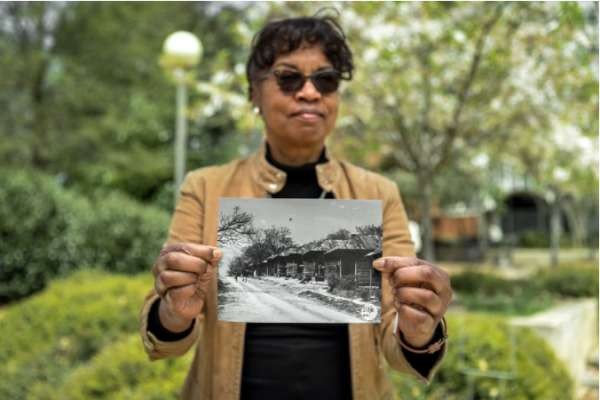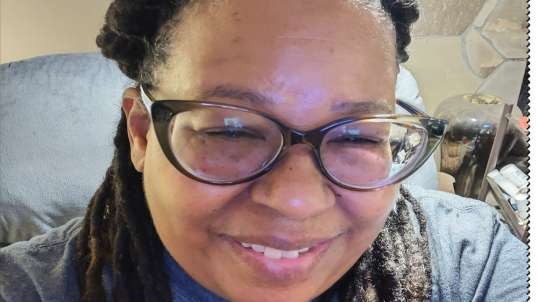WITHIN THE BOUNDS of a block in Athens, Georgia, three high-rise dorms stand where 50 Black families used to live. The dorms were built in the 1960s as part of the federal government’s urban renewal program, which empowered cities and colleges to seize property in the name of so-called slum clearance. As the University of Georgia and the Athens city government requisitioned lots and burned homes to the ground, they steered many residents into public housing. According to the University of Richmond’s “Renewing Inequality” project, 298 families in Athens were displaced during this period, 176 of the families of color.
In February, nearly six decades later, the county began its first attempt to offer redress. “The Unified Government of Athens-Clarke County extends to former residents of Athens’ Urban Renewal Districts, their descendants, and to all Athenians a deep and sincere expression of apology and regret for the pain and loss stemming from this time, and a sincere commitment to work toward better outcomes in all we do moving forward,” pledged Mayor Kelly Girtz in a signed proclamation. Two weeks after that, the county’s 10 commissioners voted unanimously to adopt a resolution that apologized specifically for the county’s role in destroying Linnentown, the Black, middle-class community that preexisted the UGA dorms.
The resolution acknowledges the seizure of residents’ homes and the perpetration of “an act of institutionalized white racism and terrorism resulting in intergenerational Black poverty, dissolution of family units, and trauma.” It pledges, among other things, to erect an on-site memorial honoring the legacy of Linnentown and create a new center on slavery, Jim Crow laws, and the future of Athens’s Black communities. Perhaps most importantly, it promises to calculate the total amount of intergenerational wealth lost through urban renewal and use that number to inform annual participatory budgeting on projects for redress — in other words, public funding for reparations.
The resolution is the first official act of reparations in Georgia, but those involved in its creation hope it won’t be the last. They aim to model an example for communities throughout the state and across the country, even as they recognize their success in the progressive city of Athens will be difficult to replicate. Nationally, reparations remain controversial at best. Last summer, amid mass protests for racial justice, one poll found just 1 in 5 respondents agreed the United States should use “taxpayer money to pay damages to descendants of enslaved people in the United States.” At the time, the city council in Asheville, North Carolina, approved a reparations resolution, but leaders have since stalled in distributing funds, and the resolution’s lead sponsor lost his reelection.
Still, Girtz told The Intercept, “I think it will spread to other places.” The mayor pointed to St. Paul, Minnesota, which earlier this year passed a resolution to study reparations, and his hometown of Norfolk, Virginia, which is also reckoning with its lasting segregation. Evanston, Illinois, a wealthy Chicago suburb, last month announced its own reparations program: a plan to distribute $10 million over the next decade to Black residents who can show that they or their direct relatives lived in the city and suffered from racial discrimination between 1919 and 1969.
In February, White House press secretary Jen Psaki confirmed that President Joe Biden is open to studying federal reparations, though Biden has not committed to signing H.R. 40, a bill to fund a study of slavery and recommend “appropriate remedies,” in the event that it passes. The former Linnentown residents say they hope to testify before Congress on reparations and the harms of urban renewal. They have also requested meetings with their new senators, Jon Ossoff and Raphael Warnock, and plan to push for a constitutional change at the state Legislature to make distributing direct payments easier.
Hattie Thomas Whitehead, a 72-year-old Black woman and fourth-generation Athenian, is one of at least 10 living former Linnentown residents. She knows their organizing work is far from over and that the next few months will be critical for ensuring that her government meets its pledges. Still, she can hardly believe they’ve reached this point.
“They voted on it in Black History Month, which is just a tremendous time for it to get approved,” she told The Intercept. “The night I watched the vote, and it was 100 percent, I was brought to tears.”
Thomas Whitehead lived in Linnentown until she was 14, when urban renewal came to Athens. Leaders burned down her home and directed her family into public housing. While details of Linnentown’s destruction had been passed down orally for decades, Thomas Whitehead said that until recently, descendants just lacked the hard data needed to make their case for justice. “Being part of this project has given me a voice,” she said. “It’s bringing healing.”
FINDING DATA ON the destruction of Linnentown began as an accident. A philosophy doctorate and library employee at UGA named Joseph Carter was doing research in December 2018 for a living wage campaign with the United Campus Workers of Georgia — hoping, he said, “to make the case for how the university suppresses wages in the county, and how that then has an effect on the local housing market.”
He called up an Athens-Clarke County commissioner, Melissa Link, who said she had heard rumors of an old community that used to be where three high-rise UGA dorms now stand. Carter began digging around in the UGA Special Collections Libraries, where he discovered many documents about urban renewal, including early 20th-century fire insurance maps that showed the Linnentown homes. The case file was called “Urban Renewal Project GA. R-50.”
Through a friend of Link’s, Carter connected with Geneva Johnson, a former Linnentown resident still living in Athens. When contractors demolished Johnson’s childhood home, her father was permitted to move another Linnentown house off-site to the neighborhood of East Athens, where she still lives today. Her home is one of just three surviving structures from the neighborhood.
Johnson, Carter, and Thomas Whitehead connected with three more Linnentown descendants, and together they launched a campaign called the Linnentown Project in September 2019.
That month, Thomas Whitehead spoke publicly about her displacement for the first time, in a speech she gave to a full house at a local arts center. In the autumn months that followed, the Linnentown Project began drafting its proposed resolution and started its outreach to UGA and city leaders.
Word spread through the community, and by February 2020, dozens of residents and students poured into Athens’s City Hall to demand recognition and reparations for Linnentown descendants. Protesters stood with hand-painted signs bearing messages like “UGA Took Our Homes Away” and “Redress for Linnentown.”
EVEN IN A left-leaning city like Athens, unanimous support for reparations was in no way guaranteed. Some lawmakers initially shied away from using terms like “white racism and terrorism” to describe the displacement of Black families and the burning of their homes. According to Mariah Parker, a county commissioner who helped draft the proposal, some leaders found the language too harsh and feared alienation from the university, which has refused to acknowledge any harms related to Athens’s urban renewal. Commissioners Patrick Davenport and Russell Edwards were originally against the resolution, but by the night of the vote in February, Edwards apologized for his initial opposition.
“It was an act of terrorism. It was an act of white supremacy,” he said. Davenport voted in favor as well.
Last June, Jerry NeSmith, another commissioner who opposed the resolution, died in an accident; his successor, Jesse Houle, made support for the Linnentown Project part of their campaign platform. Carol Myers, another commissioner newly elected last year, also ran in support of the Linnentown Project.
As the year went on, some Linnentown Project activists protested for racial justice following the death of George Floyd. One local demonstration ended with Athens-Clarke police and National Guardsmen spraying tear gas on peaceful protesters, and soon after, Girtz approached Thomas Whitehead about moving forward with the Linnentown reparations effort.
“My hunch is he realized how much he screwed up with the protests, with the tear gassing and the arrests, and so then made the decision to move ahead with the Linnentown committee,” said Carter.
While a year of pressure, one-on-one meetings, and racial justice organizing helped bring the mayor and all 10 county commissioners on board, the university still spurns any suggestion of its culpability.
UGA sent a statement to Athens-Clarke County commissioners in January 2020, saying it “respectfully disagrees” with the “conclusions” of the Linnentown Project. As college enrollment surged during the 1960s, institutions nationwide began taking advantage of eminent domain to make room for new students. Historical documents reveal how UGA officials worked closely with city and federal leaders to leverage funds and move urban renewal forward.
Thomas Whitehead said she’s disappointed but not surprised UGA has given them the cold shoulder. “UGA has never acknowledged anything they’ve ever done that was not in the community’s favor,” she said.
This year, the university is celebrating its 60th anniversary of desegregation, replete with signs and commemorative events throughout the spring. On its special website for the cause, the university is soliciting donations to “support diversity, equity and inclusion efforts across campus today.”
Meanwhile, UGA continues to dismiss entreaties from Black Linnentown descendants. “They continue to ignore the residents and that in itself is just a continued slap in the face,” said Carter. “They’re just acting like it’s the 1960s all over again.”
UGA has not commented.
While local leaders say they would prefer to partner with UGA to create their wall of recognition, Athens-Clarke County intends to build the memorial with or without the university’s collaboration.
“It’s best to acknowledge that there were some horrible things done in the not-so-distant past, because then we can move together more strongly,” said Girtz. “We’re going to be moving forward, and I would hope UGA joins us.”
THE ATHENS BUDGET planning period runs from now through June. As part of that process, a committee chaired by Thomas Whitehead and fellow Linnentown descendant Bobby Crook will make recommendations for how to spend the reparations funding.
Girtz is looking to hire an economist to help community members calculate how much more money Linnentown descendants might have today, had they been permitted to stay in their homes. He plans first to approach Mehrsa Baradaran, a former UGA law professor and the author of “Color of Money,” a book on the racial wealth gap. Baradaran now works as a law professor at the University of California, Irvine, and progressives nationally have been pushing Biden to appoint her to lead the Office of the Comptroller of the Currency.
Parker, the commissioner, said she sees the work ahead as focused on both delivering material redress to descendants of Linnentown and launching additional efforts to help other lost and displaced communities in Athens. She and several local activists plan to ramp up pressure on their state legislature to change the so-called gratuities clause in Georgia’s constitution.
The clause, which was initially passed as an anti-corruption measure, prevents local governments from providing direct cash payments to individuals and nonprofits. This hampers not only reparations efforts but also broader economic relief.
In January and February, Thomas Whitehead sent letters to Ossoff and Warnock’s offices to request assistance tackling Georgia’s gratuities clause. The senators have not yet answered, nor did they return The Intercept’s requests for comment.
Carter acknowledges that the success in Athens could be difficult to replicate elsewhere, particularly given the treasure trove of evidence they had available to make their case.
“There are communities in Atlanta that were affected by Georgia Tech and Georgia State that we want to take a look at, but the thing I’m concerned about is the availability of historical documents and who from those communities is still around,” he said. “To do this organizing you have to come with evidence, and with residents who see this as something that they want. Are the residents alive? Are they willing? Interested?”
According to Carter, an essential part of the process in Athens is that the decisions about how to achieve reparations have been on the Linnentown descendants’ own terms and that they’ve been given power by their local government to make those calls.
“We believe part of reparations should be to reallocate not just money but political power,” he said. “It’s not just you write a check and you’re done.”
By Rachel M. Cohen









